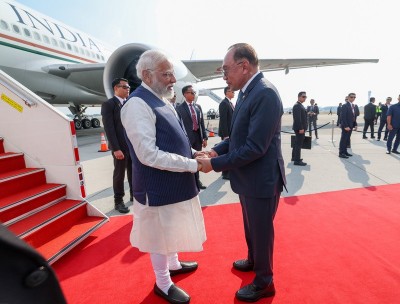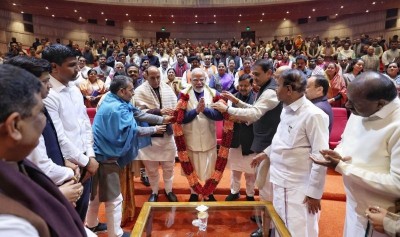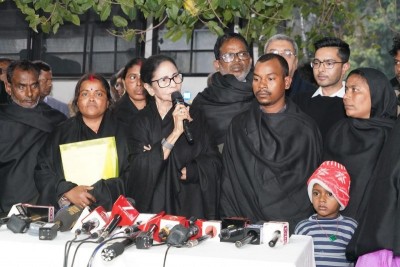
Khyber Pakhtunkhwa: Terror Untamed
A day earlier, on January 19, 2016, a TTP suicide bomber targeted the tribal Khasadar(locally raised security formations selected from each tribe) force at the Karkhano checkpost, the entry-point to Peshawar from the Khyber Agency in the Federally Administered Tribal Areas (FATA), and killed 12 persons, including a journalist, Mehboob Shah Afridi, while 39 others sustained injuries. Afridi, president of the Tribal Union of Journalists, Khyber Agency chapter, was talking to the Line Officer Nawab Shah at the time of the attack.
In the latest of a series of attacks on Security Force (SF) personnel, unidentified terrorists shot dead two personnel of the Police Elite Force Unit in the Rasheed Ghari area of Peshawar on January 22. Superintendent of Police (SP) Imtiaz disclosed that the Policemen were trained in the use of security scanners. The motorcycle-riding assailants escaped from the site of the attack.
According to the South Asia Terrorism Portal (SATP) database, KP has recorded at least 27 terrorism-related fatalities, including 21 civilians, four terrorists and two SF personnel, in the first 22 days of the current year, 2016. During the same period of the preceding year the Province had recorded 18 such fatalities, including eight civilians, eight terrorists and two SF personnel, indicating a definite increase in the level of terrorist violence.
While the trend in 2016 is nascent, it conforms to the trajectory established over the preceding six months, as compared to the first six months of 2015. While total fatalities stood at 119 (63 civilians, 23 SF personnel, 33 terrorists) between January and June 2015, they increased to 149 (54 civilians, 53 SF personnel, 42 terrorists) between July and December 2015. Significantly, the two major incidents of January 2016 followed the December 29, 2015, attack in which a suicide bomber had blown himself up at the gate of National Database and Registration Authority (NADRA) office located on the Link Road in Mardan town, killing 26 people and injuring 50. The blast took place at a time when the office was crowded, with people lining up to apply for Computerised National Identity Cards (CNICs). The JuA, a TTP splinter, claimed responsibility for the attack.
It will clearly be a major challenge in 2016 to sustain the declining trend of fatalities recorded in the Province since 2014 on an year on year basis. Terrorism-related fatalities recorded a sharp decline from 617 fatalities (406 civilians, 108 SF personnel and 103 terrorists) in 2014, to 268 fatalities, including 117 civilians, 76 SF personnel and 75 terrorists, in 2015. This was the lowest number of such fatalities recorded in the Province since the formation of TTP in 2007. At its peak in 2009, terrorism in the Province had accounted for 5,497 fatalities (1,229 civilians, 471 SF personnel, 3,797 terrorists).
Other parameters of violence also saw a drop. The Province recorded six suicide attacks resulting in 63 fatalities and 113 injured through 2015, as against nine such attacks recorded in 2014, resulting in 196 fatalities and 260 injured. KP also saw 19 major attacks (each resulting in three or more fatalities) causing 133 deaths in 2015, as against 49 major attacks accounting for 436 deaths in 2014. The number of explosions and resulting fatalities stood at 40 and 77 respectively through 2015, as against 109 and 354, respectively, in 2014. Violent incidents in 2015 were reported from 21 of the 26 Districts in the Province. In 2014, violent incidents were reported from 22 Districts. The number of sectarian attacks decreased from nine in 2014 to five in 2015, though the resultant fatalities increased to 28 in 2015 from 18 in 2014. As in 2014, Peshawar, the provincial capital, remained the worst affected District through 2015, recording 74 terrorism-related incidents, in which 99 people were killed and another 91 were injured.
Nevertheless, the attack on January 20, 2016, clearly demonstrates that the terrorists retain capacities to execute significant attacks at will. Moreover, through 2015, the number of terrorists neutralized in the Province stood at 75, the lowest since 2006, when it was 27. However, an assessment on the implementation of the National Action Plan (NAP), undertaken in the wake of the Peshawar APS attack, which was released on November 11, 2015, stated that SFs in the Province have made over 10,000 arrests, 22,000 detentions and 508 search and strike operations from December 17, 2014 to October 31, 2015. However, the rise in extortion activities and the recent incidents of killing in the Province raise doubts over the quality and impact of such arrests and detentions.
In the interim, the Government has sought repeatedly to buy peace with the terrorists, and SF operations have slowed down in the Province. Expectedly, the terrorists are using this phase of relative peace to regroup and regain their strength, with rampantextortion to shore up their war chest. The worrisome growth of extortion activities in the Province in general and in provincial capital Peshawar in particular is a matter of concern. Peshawar has emerged as a second extortion capital, after Karachi, in recent times. According to Peshawar Police data released on November 14, 2015, as many as 58 cases of extortion had been reported under separate Police Stations falling under three Police Circles over the preceding 10 months. Of these, 38 were reported in the Peshawar Cantonment Circle; 14 in Peshawar City Circle; and six in the Peshawar Rural Circle. An unnamed Police official, on the condition of anonymity, is reported to have stated that the actual incidence would likely be much higher, because most victims don't contact the Police out of fear. Data collected from the Central Police Office, Peshawar, puts the annual average of extortion cases registered during years 2011, 2012, and 2013, at 30 per year. 13 cases of extortion were registered in 2011; 21 in 2012; 56 in 2013. The figure rose abruptly to 285 cases in the first three quarters of 2014.
In another worrying development, the Islamic State of Iraq and Levant [ISIL, later, the Islamic State (IS) or Daesh] appears to be making inroads in the already volatile region. Pamphlets and hate materials were recovered and suspected persons linked with the outfit were arrested through 2015. On May 15, 2015, Police arrested two suspects during a raid for allegedly circulating Daesh literature in the Nauthia area of Peshawar. Similarly, on July 2, 2015, Police arrested three suspected terrorists said to be inspired by the Islamic State from the Shamshadu Bazaar area of Peshawar. Inspector General of Police (IGP), KP, Nasir Khan Durrani conceded, "IS's presence in Pakistan is not a new phenomenon, members who belonged to the outlawed TTP have switched sides in some cases. It is wrong to say IS does not have a presence in KP."
Meanwhile, Islamabad has demonstrated extraordinary ambivalence towards ending the menace of terrorism. According to a January 23, 2016, report, the Federal Government has failed to respond to the KP Government's request for a PKR 66.280 billion special security package for the Province, made on March 24, 2015. Concerned officials told the media, on January 22, 2016, that the KP Government had written again to the Federal Finance Ministry on December 31, 2015, reminding it of the Province's financial needs for security. No response had been received.
Worse, instead of working for the de-weaponisation of society, the Government appears to be promoting the menace of a gun culture. On January 14, 2015, in a bizarre response to the Peshawar APS attack, the KP Government granted male teachers permission to carry licensed weapons in school. Media reports on April 19, 2015, quoting the statistical documents submitted by the Provincial Home and Tribal Affairs Department to the Provincial Assembly, disclosed that licenses for around 161,441 prohibited bore weapons had been issued since May 2013. According to documents submitted, Bannu District topped the list with around 66,000 licences issued. When contacted, Bannu Deputy Commissioner Mohammad Ayaz Khan stated, on April 19, 2015, that the issuance of 66,000 licences in the District during the preceding two years was astonishing: "I doubt this figure. Let me check it because I don't believe that licences would have been issued in such a large number."
Against the Government's lackadaisical approach, the terrorists continue to issue new threats. Following the December 29, 2015, attack targeting NADRA, JuA 'spokesman', Ehsanullah Ehsan, had warned, "NADRA is an integral part of the State and any such targets that directly or indirectly work for the State will be our target." Most recently, on January 22, 2016, releasing a video showing four attackers involved in January 20, 2016, University attack, Umar Mansoor warned, "Now we will not kill the soldier in his cantonment, the lawyer in the court or the politician in Parliament but in the places where they are prepared, the schools, the universities, the colleges that lay their foundation. With the mercy of god, our attacks on all universities and schools will continue."
The Bacha Khan University attack has once again underscored Pakistan's enormous vulnerabilities, particularly to soft target attacks, as well as the capacity and intent of terrorist formations to inflict harm on the country's social and political fabric. The state is yet to demonstrate the will and the capacity to wipe out terrorism, and state agencies remain deeply embroiled with a range of terrorist factions operating across international borders. Widespread weaponisation of non-state actors and active collusion of state agencies have created an environment in which terrorism - including domestic groups that have gone rogue and target the state itself - flourishes. The transient rise and fall of trends in domestic terrorist violence are yet to alter the fundamental and perverse realities of Pakistan.
Support Our Journalism
We cannot do without you.. your contribution supports unbiased journalism
IBNS is not driven by any ism- not wokeism, not racism, not skewed secularism, not hyper right-wing or left liberal ideals, nor by any hardline religious beliefs or hyper nationalism. We want to serve you good old objective news, as they are. We do not judge or preach. We let people decide for themselves. We only try to present factual and well-sourced news.







